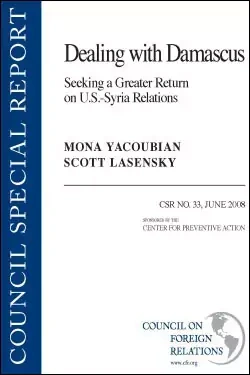
Dealing with Damascus
Seeking a Greater Return on U.S.-Syria Relations

- Council Special Report
- Concise policy briefs that provide timely responses to developing crises or contributions to current policy dilemmas.
Overview
Syria has more often than not represented a problem for U.S. foreign policy.
Its unwillingness to make peace with Israel, close ties to Iran, political and military interference in Lebanon, and support for Hezbollah and Hamas—both of which appear on the U.S. State Department’s list of Foreign Terrorist Organizations—have caused significant strain. Syria itself is one of five countries on the State Department’s list of State Sponsors of Terrorism. In recent years, bilateral tensions have further increased over Syria’s role in allowing militants and weapons into Iraq. Damascus is also widely suspected of involvement in the 2005 assassination of former Lebanese prime minister Rafik Hariri and of attempts to build a nuclear reactor with help from North Korea.
More on:
At the same time, the United States and Syria have a history of limited cooperation and there are occasions when U.S. and Syrian interests overlap. The United States facilitated the negotiation of the disengagement agreement between Israel and Syria after the 1973 Arab-Israeli war. In 1990 and 1991, Syria took part in the U.S.-led Gulf War coalition that expelled Iraqi forces from Kuwait. Then, after the war, Syria attended the Madrid Conference sponsored by the United States and the Soviet Union. It also sent a representative to the Annapolis conference held by the Bush administration in November 2007. And most recently, it was announced in May 2008 that Israel and Syria were engaging in peace talks through Turkish mediators.
In this Council Special Report, Mona Yacoubian and Scott Lasensky make a strong case that the Bush administration’s policy of diplomatic isolation of Syria is not serving U.S. interests. They provide guidance for U.S. policy toward Syria on questions concerning Lebanon, Israel-Syria peace talks, and Iraq. But wherever one comes out on these and other difficult questions, the report offers informed history and thoughtful analysis of the country and its behavior.
More on:
 Online Store
Online Store